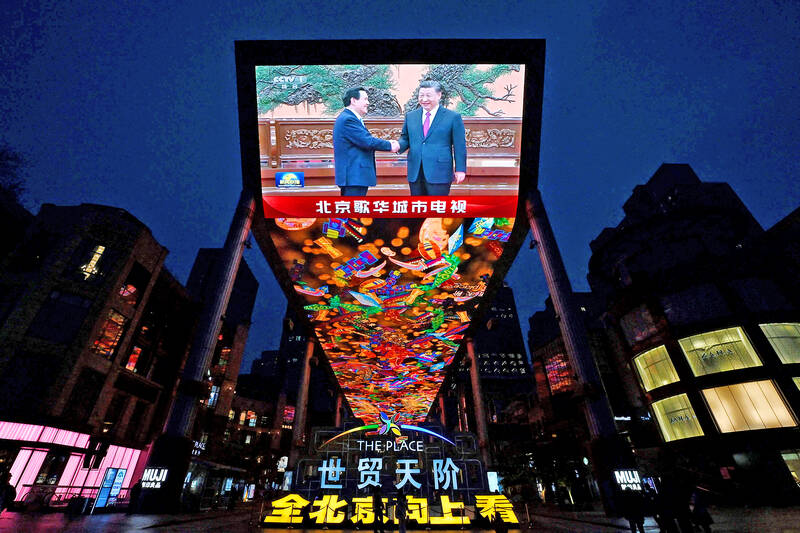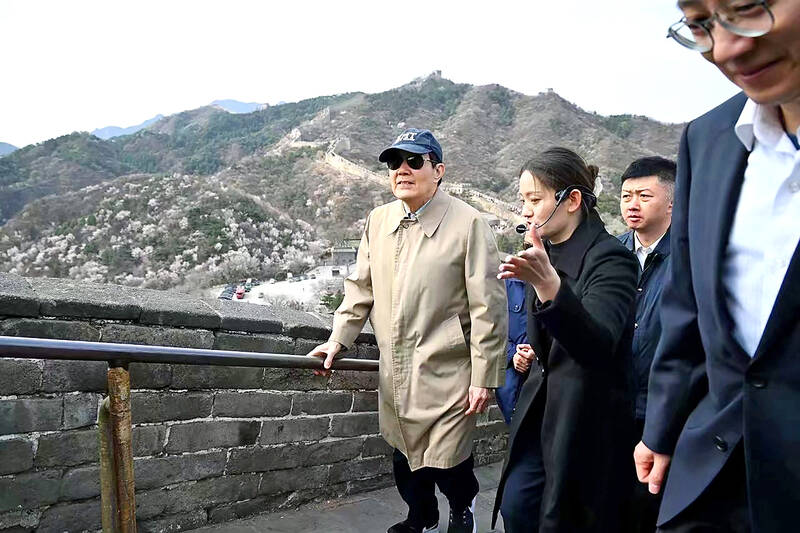Over the course of former President Ma Ying-jeou’s (馬英九) 11-day trip to China that included a meeting with Chinese Communist Party (CCP) leader Xi Jinping (習近平) a surprising number of people commented that the former president was now “irrelevant.” Upon reflection, it became apparent that these comments were coming from pro-Taiwan, pan-green supporters and they were expressing what they hoped was the case, rather than the reality.
Ma’s ideology is so pro-China (read: deep blue) and controversial that many in his own Chinese Nationalist Party (KMT) hope he retires quickly, or at least refrains from speaking on some subjects. Regardless of whatever others wish for, he remains relevant.
Of course a sitting president is more influential than a former one, but former presidents can maintain relevance if they choose to. It is undeniable Ma has remained active and engaged in politics, is very interested in maintaining relevance and has succeeded at being so both internationally and domestically.

PHOTO: AFP
Former presidents still represent their countries, if only in the past tense. At one time Ma was the popularly elected president in 2008, was re-elected in 2012 and continued to technically represent the country until 2016, though his popularity was so low after the Sunflower movement, only a small minority continued to support him.
Internationally, the former president has been speaking at events and to the foreign media, often to the consternation of the Tsai Ing-wen (蔡英文) administration and the current leadership of the KMT by making comments that are very out of sync with Taiwanese mainstream public opinion and contrary to the carefully crafted image Tsai has created of Taiwan as a plucky democracy standing tall in the face of the behemoth across the strait.
DESCENDENTS OF THE YELLOW EMPEROR

PHOTO: EPA
Both trips that Ma has made as head of his foundation with students in tow have illustrated how relevant he remains to the CCP and Xi, with repercussions on Taiwan’s domestic politics. During his trips, Ma has emphasized his belief that the Taiwanese and Chinese are one people, one culture and one nation as descendants of the mythical founder of the Chinese nation, the Yellow Emperor. On this last trip he stated that a majority of Taiwanese “have an extremely strong belief in Chinese culture and ethnic identity,” which is a statement at odds with polling.
The former president’s appeal to Chinese ethnonationalism to both sides of the Taiwan Strait echoes many of the propaganda lines put forth by the CCP. The Chinese state-owned media was saturated with carefully edited quotes and actions by Ma.
Ma was not repeating CCP propaganda for their benefit, but rather because these are things he genuinely believes deep in his heart. The deep blue wing of the KMT believes in Chinese ethnonationalism and the unity of the Chinese nation, which to them includes Taiwan.

Photo: AFP / Ma Ying-jeou Foundation
It is not surprising that Ma thinks this way. People often forget he is Chinese, born of Chinese parents loyal to the KMT who had fled the Chinese Civil War to Hong Kong at the time, and was later raised in Taiwan at a time when the KMT continued to hold dreams of reclaiming the “mainland” and restoring Chinese “unity.”
While he is popular with, and relevant to Xi and the CCP in a positive way from their perspective, from the perspective of Taiwanese mainstream public opinion and the Tsai administration he is relevant — but in a negative sense. Regardless, his trips to China and comments at international events and to foreign media generate considerable press coverage, which is not something an “irrelevant” person could do.
HEAVYWEIGHT ELDER
In the KMT he retains considerable power in spite of holding no official party position. Culturally, the KMT has long been dominated or heavily influenced by party elders. When he was younger, Ma had to defer to his elders, but today he is the most heavyweight elder.
When former KMT chair Johnny Chiang (江啟臣) attempted to remove the so-called “1992 Consensus” from the party’s platform but at the last minute dropped his attempt prior to a party congress, it was widely assumed that Ma was behind this to preserve his legacy, though internal KMT party member polling at the time suggested Chiang’s attempt might have failed regardless. Current party chair Eric Chu (朱立倫) similarly tried to downplay it as a “non-consensus consensus” and hinted at dropping it, but in the end he had to back down and reaffirm his support for the “1992 consensus.”
In November last year, during the presidential campaign, it was Ma who was able to bring Chu, KMT presidential candidate Hou You-yi (侯友宜), Taiwan People’s Party (TPP) candidate Ko Wen-je (柯文哲) and then independent candidate Terry Gou (郭台銘) to the negotiating table to attempt to form a unity ticket against the Democratic Progressive Party’s (DPP) William Lai (賴清德). The negotiations were unsuccessful, through no fault of Ma, but that he was able to pull these three powerful men into a room together was impressive and it is hard to imagine anyone else capable of doing that.
DOUBLE-EDGED SWORD
During election season, the former president is usually an asset, but occasionally a liability.
Though we do not have exact numbers, it is well-known he still has many supporters within the KMT base. Internally, the KMT probably has a clearer idea of how relevant he is to rallying the base and helping to get out the vote.
That the KMT features Ma prominently at major campaign rallies is a clear indication that the party continues to value his abilities, charisma and popularity with pan-blue voters. This is not dissimilar to the recent record-breaking fundraiser held by US President Joe Biden with former presidents Barack Obama and Bill Clinton. They still have star power in the Democratic base, and so does Ma with the KMT base.
In any election rallying the base and getting out the vote is critical, but also important is winning over independent and undecided voters. This is where his relevance can turn negative for the KMT, much to the chagrin of the current party leadership.
A prime example of this is an interview he gave with Deutsche Welle on the eve of the presidential election in January. Demonstrating the importance of the interview, both their Chief International Editor and Taipei bureau chief were present, and they did a very good job at getting the former president to speak his mind.
He did not say much that he had not said before, but it was a striking interview because it was in essence a “greatest hits” of his controversial views all packaged together in one interview. Hearing them all one after another was far more impactful than in the past, when he had only voiced one or two here or there.
Among the long list of controversial comments he made are “No matter how much you defend yourself, you can never fight a war with the mainland. You can never win, they [China] are too large, too much stronger than us,” and Taiwan “should not place all our faith in defense.” He also said that constitutionally speaking, unification was “acceptable to Taiwan” and described the notion Taiwan should spend enough on its military so that it could hold off a Chinese attack until the US or Japan could assist as “too optimistic.”
Sensitive as the local press is to foreign coverage of Taiwan, this was a huge story. This was electoral poison with independent and undecided voters and a huge embarrassment to Chu and his efforts to bring the party closer to mainstream public opinion.
So the KMT disinvited the former president from the hugely important and massive election eve rally. Much as the KMT tried that night, there is no way to wish Ma out of the picture as long as he wants to stay relevant.
Donovan’s Deep Dives is a regular column by Courtney Donovan Smith (石東文) who writes in-depth analysis on everything about Taiwan’s political scene and geopolitics. Donovan is also the central Taiwan correspondent at ICRT FM100 Radio News, co-publisher of Compass Magazine, co-founder Taiwan Report (report.tw) and former chair of the Taichung American Chamber of Commerce. Follow him on X: @donovan_smith.

On April 26, The Lancet published a letter from two doctors at Taichung-based China Medical University Hospital (CMUH) warning that “Taiwan’s Health Care System is on the Brink of Collapse.” The authors said that “Years of policy inaction and mismanagement of resources have led to the National Health Insurance system operating under unsustainable conditions.” The pushback was immediate. Errors in the paper were quickly identified and publicized, to discredit the authors (the hospital apologized). CNA reported that CMUH said the letter described Taiwan in 2021 as having 62 nurses per 10,000 people, when the correct number was 78 nurses per 10,000

As we live longer, our risk of cognitive impairment is increasing. How can we delay the onset of symptoms? Do we have to give up every indulgence or can small changes make a difference? We asked neurologists for tips on how to keep our brains healthy for life. TAKE CARE OF YOUR HEALTH “All of the sensible things that apply to bodily health apply to brain health,” says Suzanne O’Sullivan, a consultant in neurology at the National Hospital for Neurology and Neurosurgery in London, and the author of The Age of Diagnosis. “When you’re 20, you can get away with absolute

May 5 to May 11 What started out as friction between Taiwanese students at Taichung First High School and a Japanese head cook escalated dramatically over the first two weeks of May 1927. It began on April 30 when the cook’s wife knew that lotus starch used in that night’s dinner had rat feces in it, but failed to inform staff until the meal was already prepared. The students believed that her silence was intentional, and filed a complaint. The school’s Japanese administrators sided with the cook’s family, dismissing the students as troublemakers and clamping down on their freedoms — with

As Donald Trump’s executive order in March led to the shuttering of Voice of America (VOA) — the global broadcaster whose roots date back to the fight against Nazi propaganda — he quickly attracted support from figures not used to aligning themselves with any US administration. Trump had ordered the US Agency for Global Media, the federal agency that funds VOA and other groups promoting independent journalism overseas, to be “eliminated to the maximum extent consistent with applicable law.” The decision suddenly halted programming in 49 languages to more than 425 million people. In Moscow, Margarita Simonyan, the hardline editor-in-chief of the